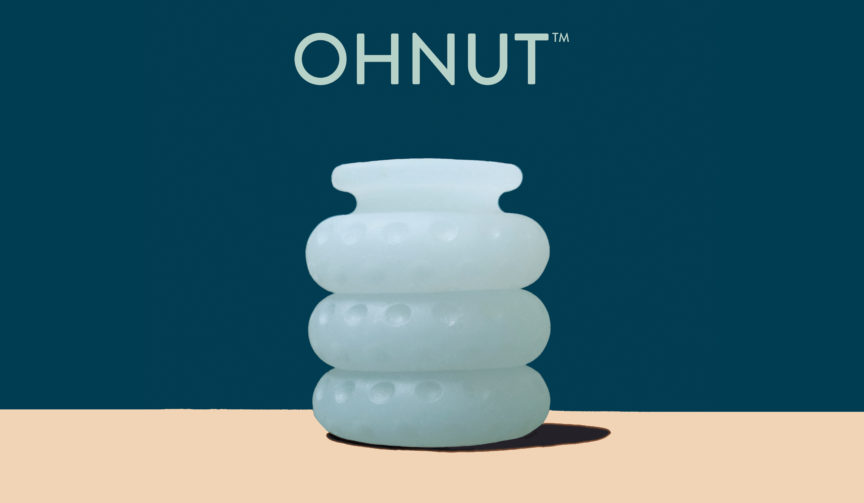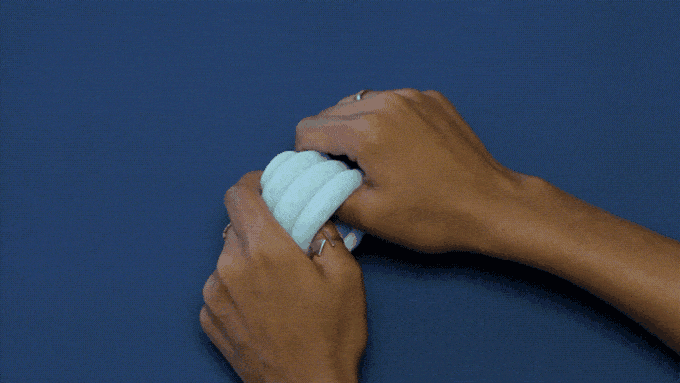
Emily Sauer is the founder of Ohnut, an intimate health wearable for painful intercourse that allows you to customize the depth of penetration (think of a “donut” made for decreasing pain and thus increasing pleasure). We asked her a few questions about it (see below). It’s a super cool product for a widespread but under-acknowledged problem. The Ohnut recently reached and exceeded its Kickstarter goal of 50K goal: pre-order yours here!
“Denying the fact that sometimes sex hurts is like being embarrassed to have the flu.”
How did you come up with the idea?
At 33 years old, if you’d asked me what is one secret I never discussed with anyone, it would have been that sometimes intercourse was painful for me. Once I came up with the original product idea (and realized that it worked), I mustered the courage to start talking about this problem and the fact that there was a potential solution. To my surprise friends, strangers, even family members came out and told me they had this problem too. It was a complete paradigm shift for me. I found out how pervasive painful sex is and thought, “This is not okay.” I then took matters into my own hands and built a crude prototype which then evolved into Ohnut.
How common is painful intercourse?
Seventy-five percent of women have experienced painful intercourse — 75%! It’s both surprising and unsurprising that that many women will have painful sex in their lifetime, but it is the collective silence around it that perpetuates the associated shame, self-critique, and feeling of being alone. Alone! I thought no one else knew what I was going through for 10 years, and the second Ohnut became a vehicle for communication I couldn’t believe how alone I wasn’t. From there the conversation snowballed.
Over the course of Ohnut’s business development, we’ve been able to genuinely connect in unexpected ways around a very real challenge for an enormous population, because we’ve been able to strip away the judgement and offer a sense of normalcy, respect, and hope. Denying the fact that sometimes sex hurts is like being embarrassed to have the flu.
By introducing an intimate wearable into the mainstream (not a toy, not a medical device — a wearable) all of a sudden there’s neutral common ground to have curious conversation. It’s a joy to discover how genuinely liberating it feels to be honest about subject matter that is unnecessarily rife with boundaries. “Do you know anyone who’s had painful sex? Chances are you do.” It’s true. And this is not just a conversation for women and female-bodied people! Men/partners have been showing up in the most incredible ways, eager to learn. Our male testers find themselves asking, “Does this feel good? What about this?”
It’s also been exciting that Ohnut’s application for transgender women [after gender-affirmation surgery] is becoming a part of a larger conversation of inclusivity. Down the line we hope to do a more formal clinical study with referrals from doctors for post-op trans women. Right now there is very little support from surgeons regarding maintaining sexual health (physically and mentally) post surgery – and we hope that Ohnut will encourage that conversation between patient/doctor (for cis-women too!).
Why do you think it’s an underreported phenomenon?
This is a can of worms. The societal silence around painful intercourse and pelvic health is part of a larger systemic problem where our medical institutions, education systems, and insurance policies generally don’t support female sexual dysfunction. Delays in diagnoses (which generally range from 6 to 10 years) have been shown to be greater for women reporting pelvic pain compared to those reporting infertility, suggesting that there is greater laxity surrounding pelvic pain symptoms versus procreation. Gynecologists aren’t trained to make the necessary diagnoses around pelvic pain (which to be somewhat fair, are hard to make because often times causes of dyspareunia are compounding). But more discouraging is the fact that only 40% of gynecologists routinely ask if patients even have sexual problems. And yet, even in the case that sexual problems are discussed, solutions options are often invasive, prohibitively expensive, or non-existent. Sigh.
With Ohnut, we’ve worked tirelessly with researchers in sexual medicine and pelvic health specialists to provide a product that’s ergonomically sound, fool-proof to use, and also fun to play with.

What has the reaction been like to early prototypes?
Here are some of the beta testers’ testimonials:
“It made sex feel so much more pleasurable. We just got to explore each other more.”
“When we finally got the Ohnut, he knew exactly what to do and we tried it out that night!”
“Just seeing his level of excitement and seeing how good he was feeling the entire time, it increased my sensation even more so than before I had my son. That definitely was a mutual encouraging positive thing and it also just made us bond and feel like we’re on the same page and we were communicating well and just enjoying ourselves.”
“I enjoyed sex way more! There’s a thought in my mind being hyper aware of how we’re doing. For the first time we weren’t in that overanalyzing headspace.”
“I felt more connected. Now knowing that she experiences pain at times, using the Ohnut makes me more relaxed too. I can feel her relief and her enjoyment.”
“I couldn’t tell what was my skin and what wasn’t. It felt like a hug!”
“One thing I hate about condoms is when you have to adjust them — Ohnut kept it in place.”
What would you say to the critique that this keeps the primary focus on intercourse and the penis, when so many couples would do well to think of sex as so much more than intercourse, to think beyond intercourse (handwork, oral, tantra, sex toys, mutual masturbation, etc).
We can agree that sex is far more than a penetration sport. Culturally we hyper-prioritize longer, deeper harder, (penetrative) sex with orgasms that are bigger, better, and BEST EVER than ever before (compared to everyone else). The default understanding of sex is debilitatingly competitive, hyper-focused on orgasm, and lacking intimacy for the sake of performance. To your point, yes many couples could develop significantly greater pleasure by incorporating non-penetrative techniques and alternate sexual ideologies, but the fundamental challenge for so many individuals, especially those who experience sexual displeasure, is that often times feels impossible… just to start any conversation about sex. The introduction of a friendly wearable, especially one that requires male participation (and especially one that provides a service to women who’ve previously dealt with solutions by herself), it takes a little bit of that previous focus on the “problem” and turns it into a creative collaboration.
What will it be made out of (100% silicone? body-safe? non-porous?)
Ohnut is currently made of a made with a body- and skin-safe polymer blend. The original Ohnut was designed in 100% silicone, but the problem is that silicone products aren’t compatible with silicone lubrication, and the medical community strongly encouraged that silicone lubrication be accessible with Ohnut. It can be cleaned with mild soap and warm water.
Is the size adjustable?
The Ohnut rings can be stacked length-wise to accommodate varying female / female-bodied preferences. Right now it’s one size fits most width-wise.
When will it be available for sale & how much will it cost?
First shipments will go out mid-october and it will retail for $65.
You can find out more & pre-order the Ohnut via Kickstarter.









